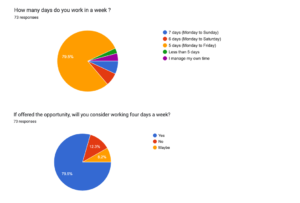By Eugene Ayeh ADU
The month of May is also a month of celebrating labour. As such, the discussion on safe working hours in this article is in good order. Since the industrial era of the 19th century, industries across the world have generally accepted and implemented an 80-hour work time. This concept of worktime was developed from varied influences like labour unions who advocated for shorter workweeks, fair wages and improved working conditions. Henry Ford, the industrialist, implemented a 40-hour workweek with five working days and no pay cuts for its assembly line workers in 1926.
For Thursday to become the new Friday in Ghana, a four-day work week must be gradually introduced, adopted and implemented across sectors of the Ghanaian economy. Ending the work-week on Thursday will be a new way to undertake remote work, savings on fuel allowances, travel time and mitigate employee fatigue/stress to make work-life possible. And just as we all love to end the work week on Fridays, the possibility of ending the work week on Thursdays will be a new breeze to save companies and employees in limitless and yet unimaginable ways .
On a global scale, post-covid work-life schedules have now adopted fewer rigid schedules – aimed at granting employees and institutions a reputable work-life balance. In making this dream a reality, some modern institutions have adapted various working modules to create flexible work schedules. Varied research opinions confirm the upsides and few downsides of a 4-day work week.
For organisations to execute a seamless four-day week for employees, existing frameworks, company policies and guides can be adopted and implemented into workable action plans. These frameworks for implementing a 4-day workweek must aim to benefit and enhance employee well-being and satisfaction while focusing on the organisation’s operations, revenue growth and annual profit turnover.
What is a work-life balance?
A work-life balance is an individual’s sustained effort to strike a reputable balance in managing personal and work time based on various indicators like working hours, paid leave, flexible work arrangements, paid maternity/paternity leave, happiness index and job satisfaction. Achieving this balanced lifestyle culminates in a higher score of happiness for countries, economies and the citizens.
Institutions globally are deploying robust company policies, feasible and remote work schedules to ensure employees remain committed to work on terms and conditions that also favour their families, health, mental wellbeing and overall work output.
Globally, top 10 countries like New Zealand, Spain, France, Australia, Denmark, Norway, Netherlands, UK, Canada and Brazil have achieved the best work-life balance scores. They have proven remote work as a workable paradigm to making work less stressful and burdensome.
Benefits of Work-life Balance (Employees & Organisation)
- Enhances employee well-being and satisfaction.
- Boosts employee engagement and productivity.
- Attracts and retains top talent in a competitive market.
- Improves work-life balance for employees and enables effective time management.
- Maintains or improves operational efficiency and customer service.
Downsides may also include the following:
Challenges for Businesses
- Scheduling complexities may arise from implementing a 4-day workweek. It will require careful scheduling and coordination, especially for customer-facing roles or teams that rely on collaboration.
- Increased workload: Condensing the workweek into four days might lead to increased workload and pressure on employees to complete their tasks within the shorter timeframe, potentially negating the intended benefit of improved well-being.
- Challenges for employees:
- Certain roles might be inherently incompatible with a 4-day workweek due to the nature of the work or the need for 24/7 coverage.
- Burnout risk: Depending on the workload and intensity of work during the four days, there’s still a risk of burnout if employees aren’t careful about managing their energy and workload effectively.
Adaptability and flexibility: Successful implementation often requires a high level of adaptability and flexibility from both employers and employees in adjusting to new work structures and overcoming potential challenges.
Eligibility Criteria: The 4-day workweek programme can be offered to all full-time employees or specific departments in phases. Eligibility criteria like job function, performance and team needs must be assessed and rolled out comprehensively.
Work Schedule & Company Gains: 4 working days will be the standard workweek, with 8 hours per day (32 hours total). Flexible work arrangements (e.g., remote work, flexible hours) may be considered to accommodate individual employee needs and team requirements. Either work remains 32 hours per week or 40 hours per week for employees to give up or receive its commensurate rewards & salary. In any agreeable situation, companies that spend less on employee costs make considerable annual savings. These savings can be reinvested in systems that maximise productivity and ensure business continuity in order to astronomically increase revenue.
Sampled Opinions of 73 Ghanaian Respondents
If offered the opportunity, will you consider working four days a week?
Response 1: ” Today’s work environment is very stressful. Commuting distance to work is longer on average, economic activities outside work more eminent and time consuming, virtually with no leisure time for self, health and family. ”
Response 2: ” I do work in excess of 8 hours a day, so 4 should be ideal with an option to work from home to compile my reports and review my work ahead of the following week ”
Response 3: ” I am a Muslim, I want Friday to be off working days so I can observe my prayers.”
Response 4: ” Technology could be deployed to aid the 4 working days, and that could save cost, fatigue and invariably an increase in the bottom line ”
Response 5: “Some more time away from the office will be nice. I do appreciate remote work. I feel I will be more productive knowing I have a few days to work.”
4 Day Work-week Cost Scenario 1:
Cost saving estimates per week per month, quarter and year of a company/ institution with 1,500 staff.
Current monthly employee bill for 1,500 staff * (multiplied by) GH¢1,600 = GH¢,400,000 for 12 months = GH¢28,800,000
Take home salary = GH¢1,600 divided by 4 working weeks or 20 working days = GH¢80 a day for 5 days
If a day’s wage is deducted for the 4-day work week schedule to be implemented, the institution pays GH¢320 a week and GH¢1,280 per employee monthly
New 4-day work week monthly bill = GH¢1,920,000 * 12 months = GH¢23,040,000
Difference in cost savings = 5-day work week – 4-day work week wages (GH¢28,800,000 – GH¢23,040,000 = GH¢5,760,000)
4 Day Work-week Cost Scenario 2:
A hybrid work routine that combines the use of a 4-day work week to maximise productivity, turnaround time, increase bottom line margins and targets.
Here, a company with any size of a workforce can work around the clock on a 4 day work-week tight schedule revolving on day and night 8 hour shifts with 3 days off work duty. This model is best-suited for manufacturing firms, production-based industries and other related companies. By applying a similar remuneration model as stated above, company targets and employee well-being will be ensured.
Implementation & Adoption in Ghana
Policymakers in our beloved country of Ghana, fellow Ghanaians and respective Foreign Direct Investors must embrace this new wave of productivity and work-life balance. Business Managers, Entrepreneurs Bankers, Teachers, Health staff and all parties involved must agree to structure their work schedules to welcome the ideology of “working the Ghanaian economy” with the employees’ well-being in mind.
Pilot Programme: A pilot programme may be considered to test the feasibility and effectiveness of a 4-day workweek before full implementation. The pilot programme should involve diverse representatives from different departments and roles. Data and feedback collected during the pilot will be used to refine the policy and address any identified challenges.
Technology and Communication: Investment in collaborative work tools and technologies will be necessary to facilitate seamless communication and teamwork in a dispersed work environment. Clear communication protocols must be established to ensure smooth information flow and project management.
Performance Management: Performance expectations and evaluation criteria will be adjusted to reflect the 4-day workweek. Emphasis will be placed on outcomes and deliverables rather than just hours worked. Regular communication and feedback mechanisms will be crucial for ensuring productivity and accountability. Companies are no longer buildings but robust systems, adaptable technologies coupled with resilient leadership.

Compensation and Benefits:
Full-time salaries and benefits can be changed for employees transitioning to a 4-day workweek. Adjustments to favour both company/employee rewards and compensation packages to reflect the reduced workweek. Here, cost savings can be made on daily, weekly, monthly, quarterly and annual employee wage/allowances or bills.
Option 1: An employee can apply his/her preferred working day (8 hours) as agreed with the employer to work at home without extra allowances/rewards.
Option 2: Also, the employer can make agreed arrangements by policy to only compensate the employee for a 32-hour schedule.
Monitoring and Evaluation: The 4-day workweek programme must be regularly monitored and evaluated to assess its impact on employee well-being, productivity, operational efficiency and customer service. Feedback from employees, managers, and clients will be gathered and used to make necessary adjustments to the programme. With variations in schedules, work arrangements and compensation structures, carefully structured implementation will roll out a worthwhile programme.
Additional Considerations: A policy framework/guide covering the scope, considerations and stakeholder interests must be formulated and implemented to serve as a starting point, and may need to be adapted for any interested institution. Legal and regulatory compliance must be ensured throughout the implementation process. Effective communication and change management strategies are crucial for successful adoption of the 4-day workweek. Collaboration with employee representatives and relevant stakeholders is essential for a smooth transition and programme success.

Case Study (South Africa’s 4-Day Work Week Pilot)
- Context: In March 2023, South Africa launched the first-ever 4-day workweek pilot programme in Africa. 28 companies from various sectors, including professional services, IT, marketing and financial services participated in a six-month trial.
- Results: The pilot concluded in September 2023 and reported promising outcomes:
- Employee benefits: 92% of participating companies reported improved employee well-being, reduced stress levels and increased job satisfaction.
- Business benefits: 78% of companies reported maintaining or even exceeding their pre-trial productivity; and 92% expressed intentions to continue with a 4-day workweek in some form.
- Unexpected findings: Contrary to initial concerns, most companies did not implement Fridays as the additional day off. Instead, they adopted various approaches like staggered days off, four 10-hour days or offering employees the flexibility to choose their off-day.
While the 4-day workweek hasn’t become widespread in Africa yet, the South African pilot programme demonstrates its potential benefits and paves the way for further exploration across Africa.
Conclusion:
By implementing a well-designed and thoughtfully executed 4-day workweek programme, institutions can reap the benefits of a happier, more productive workforce while maintaining its commitment to operational excellence and customer service. Work-life balance and work hours continue to be actively debated and continue to undergo further evolution. In adopting new work hours, it is crucial to consult with legal counsel, human resources professionals and employee representatives to ensure compliance and successful implementation. Organisational interests mixed with employees’ collective bargaining rights can Make Thursday the new Friday.
References
https://remote.com/resources/research/global-life-work-balance-index
https://time.com/search/?q=4-day+work+week










